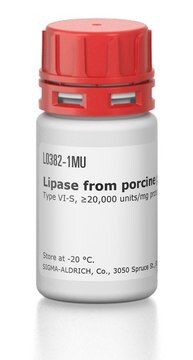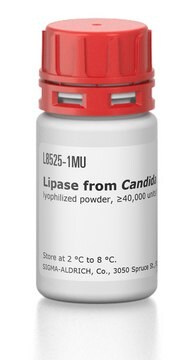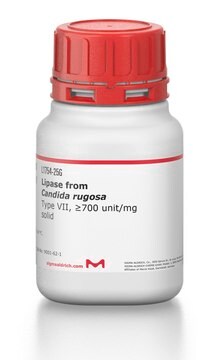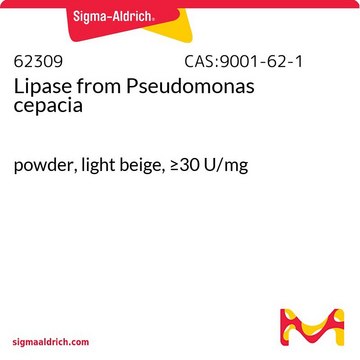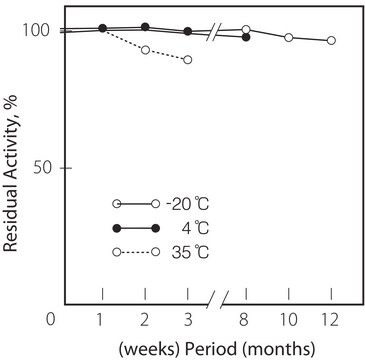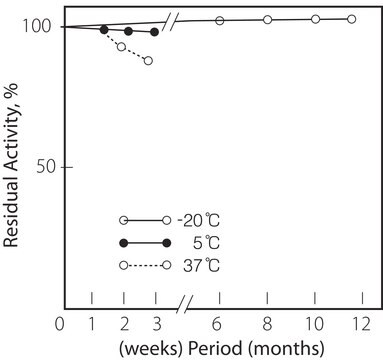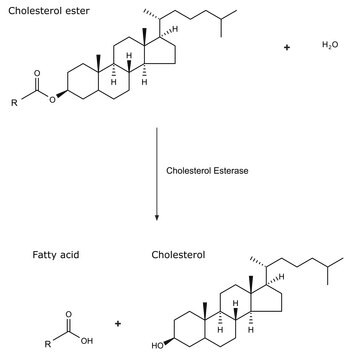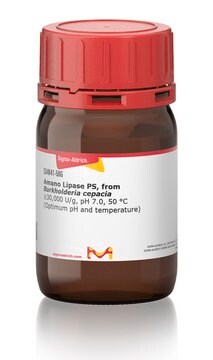L9656
Lipoprotein-Lipase aus Pseudomonas sp.
lyophilized powder, ≥50,000 units/mg solid
Synonym(e):
Diacylglycerin Lipase
Anmeldenzur Ansicht organisationsspezifischer und vertraglich vereinbarter Preise
Alle Fotos(1)
About This Item
Empfohlene Produkte
Biologische Quelle
Burkholderia spp.
Qualitätsniveau
Form
lyophilized powder
Spezifische Aktivität
≥50,000 units/mg solid
Lagertemp.
−20°C
Allgemeine Beschreibung
Lipoprotein Lipase (LPL) is a glycerol ester hydrolase. Several bacteria that produce LPL, belongs to the genus Pseudomonas, Serratia and Mucor.
Lipoprotein lipase hydrolyzes triglycerides in plasma lipoproteins causing release of fatty acids for metabolic purposes in muscles and adipose tissue.
Anwendung
Lipoprotein Lipase from Burkholderia sp. has been used in the subcellular fractionation of mussel Mytilus galloprovincialis to identify the biomolecule attached to cytosolic fraction of okodaic acid. It has also been used to test its effect on serum amyloid A induced granulocyte colony-stimulated factor (G-CSF) expression in response to bacterial lipoprotein.LipoproteinLipase from Burkholderia sp. is suitable for the synthesis ofdiarylmethanols, a precursor for the synthesis of pharmaceutical compounds.
Lipoprotein lipase has been used in a study to assess the role of lipogenic enzymes in colorectal cancer. It has also been used in a study to investigate lipasemic activity of low molecular weight heparin in rats.
Biochem./physiol. Wirkung
Due to its lipolytic activity, lipoprotein lipase was shown to effectively block the spread of hepatitis C virus into healthy cells.
Lipoprotein Lipase (LPL) hydrolysis triacylglycerol moieties in chylomicron and low density lipoproteins. LPL attaches lipoprotein to the vessel wall and facilitates their uptake. Abnormalities in LPL is associated with Alzheimer′s disease, atherosclerosis, obesity and chylomicronaemia.
Lipoprotein lipase belongs to the family of triglyceride lipases. It hydrolyses triglycerides in triglyceride-rich ApoB-containing lipoproteins.
Einheitendefinition
One unit will release 1.0 nmole of p-nitrophenol per min at pH 7.2 at 37 °C using p-nitrophenyl butyrate as substrate.
Lagerklassenschlüssel
11 - Combustible Solids
WGK
WGK 3
Flammpunkt (°F)
Not applicable
Flammpunkt (°C)
Not applicable
Persönliche Schutzausrüstung
Eyeshields, Gloves, type N95 (US)
Analysenzertifikate (COA)
Suchen Sie nach Analysenzertifikate (COA), indem Sie die Lot-/Chargennummer des Produkts eingeben. Lot- und Chargennummern sind auf dem Produktetikett hinter den Wörtern ‘Lot’ oder ‘Batch’ (Lot oder Charge) zu finden.
Besitzen Sie dieses Produkt bereits?
In der Dokumentenbibliothek finden Sie die Dokumentation zu den Produkten, die Sie kürzlich erworben haben.
Kunden haben sich ebenfalls angesehen
Lipoprotein lipase: structure, function, regulation, and role in disease
Mead JR, et al.
Journal of Molecular Medicine, 80(8), 753-769 (2002)
Lipoprotein lipase: from gene to obesity
Wang H and Eckel RH
American Journal of Physiology. Endocrinology and Metabolism, 297(8), E271?E288-E271?E288 (2009)
Subcellular distribution of okadaic acid in the digestive gland of Mytilus galloprovincialis: First evidences of lipoprotein binding to okadaic acid
Rossignoli, Araceli E and Blanco, Juan
Toxicon, 55(2-3), 221-226 (2010)
Reiner Thomssen et al.
Medical microbiology and immunology, 191(1), 17-24 (2002-07-26)
In most sera of hepatitis C virus (HCV)-infected patients beta-lipoproteins are bound to HCV RNA-carrying material, most often simultaneously with immunoglobulins (IgG, IgM) and sometimes additionally with high-density lipoproteins, forming complexes of low density (1.04-1.06 g/ml). To separate HCV particles
Studies on the Lipoprotein Lipases of Microorganisms
Arima K, et al.
Agricultural and Biological Chemistry, 31(8), 924-929 (1967)
Unser Team von Wissenschaftlern verfügt über Erfahrung in allen Forschungsbereichen einschließlich Life Science, Materialwissenschaften, chemischer Synthese, Chromatographie, Analytik und vielen mehr..
Setzen Sie sich mit dem technischen Dienst in Verbindung.
